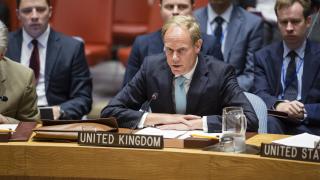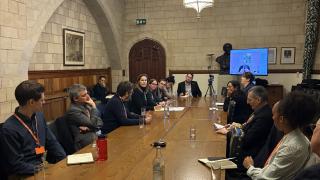
Convened amid horrifying new reports of attacks on Syria’s embattled civilian population, Sunday’s emergency session of the UN Security Council saw UK and US representatives blast Russia for its role in the most recent escalation of violence in Syria, which Russia denies.
UK Foreign Secretary Boris Johnson said: “Putin’s regime is not just handing Assad the revolver; he is in some instances firing the revolver”, whilst US ambassador Samantha Power described Russia’s actions as "barbarism".
Later in the session, UK ambassador, Matthew Rycroft went on to accuse Russia of potential war crimes: “Incendiary munitions, indiscriminate in their reach, are being dropped on to civilian areas so that, yet again, Aleppo is burning. And to cap it all, water supplies, so vital to millions, are now being targeted, depriving water to those most in need. In short, it is difficult to deny that Russia is partnering with the Syrian regime to carry out war crimes.”
In response, Russia’s ambassador, Vitaly Churkin, described the UK and US statements as “unacceptable” and reaffirmed his country’s support for the Assad regime: “The Syrian regime only uses air power to get terrorists out of the city with minimal civilian casualties”.
The unusually frank exchanges culminated in the UK, US and French representatives walking out of the Council chamber in protest as the representative from the Syrian government began to deliver his statement.
This latest episode began on 19 September, when, as the UN headquarters welcomed world leaders to the new General Assembly session, news came in that a UN convoy transmitting humanitarian aid to civilians trapped in besieged Aleppo had been devastated by airstrikes.
The attacks destroyed 18 of the 31 trucks of the aid convoy, killing over 20 civilians and representing a shocking end to a fragile, week-long ceasefire in Syria. Since then, attacks by Syrian Government forces, supported by Russia, have escalated, plunging the conflict to a grim new depth, with civilians bearing the cost. Hundreds of thousands are besieged without access to basic humanitarian supplies.
The current priority for the international community, no matter how implausible, must be a redoubling of efforts for (yet) another cessation of hostilities to allow humanitarian agencies to deliver life-saving assistance to Syria’s desperately-in-need civilians.
Throughout the conflict, in the absence of a political settlement, UNA-UK has called on Security Council members to prioritise humanitarian access and civilian protection and to agree on conditions set out by the UN humanitarian agency for improving aid delivery.
The war in Syria, with its estimated death toll of more than 400,000, exposes the acute failings of the Security Council when the five permanent members (P5) are in disagreement. Making headway in the Security Council in such circumstances remains a fundamental challenge for the UN and one that the next Secretary-General will need to address.
While in the past the P5 have been reluctant to appoint an assertive Secretary-General, the current tragedy unfolding in Syria should compel members of the Council to accept that strong leadership is required to preserve the UN’s reputation and, more generally, to be a champion for the rules-based international order to which we all – big powers and small powers alike – ultimately depend.
Image: UK ambassador Matthew Rycroft at the emergency session of the Security Council on Syria, 25 September 2016






